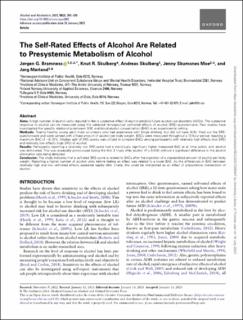The Self-Rated Effects of Alcohol Are Related to Presystemic Metabolism of Alcohol
Bramness, Jørgen Gustav; Skulberg, Knut Ragnvald; Skulberg, Andreas; Moe, Jenny Skumsnes; Mørland, Jørg Gustav
Peer reviewed, Journal article
Published version
Permanent lenke
https://hdl.handle.net/11250/3098647Utgivelsesdato
2023Metadata
Vis full innførselSamlinger
Sammendrag
Aims: A high number of alcohol units required to feel a subjective effect of alcohol predicts future alcohol use disorders (AUDs). The subjective response to alcohol can be measured using the validated retrospective self-rated effects of alcohol (SRE) questionnaire. Few studies have investigated the specific relationship between SRE and blood alcohol concentration (BAC) in an experimental setting. Methods: Twenty healthy young adult male volunteers who had experience with binge drinking, but did not have AUD, filled out the SREquestionnaire and were served with a fixed amount of alcohol per body weight. BACs were measured throughout a 12-hour period, reaching a maximum BAC of ∼0.13%. Median split of SRE-scores was utilized to compare BACs among participants with relatively high effects (low SRE) and relatively low effects (high SRE) of alcohol. Results: Participants reporting a relatively low SRE-score had a statistically significant higher measured BAC at all time points until alcohol was eliminated. This was especially pronounced during the first 2 hours after alcohol (P = 0.015) without a significant difference in the alcohol elimination rate being detected. Conclusion: The study indicates that a self-ated SRE-score is related to BACs after the ingestion of a standardized amount of alcohol per body weight. Reporting a higher number of alcohol units before feeling an effect was related to a lower BAC. As the differences in BAC between relatively high and low self-rated effects appeared rapidly after intake, this could be interpreted as an effect of presystemic metabolism of alcohol.

